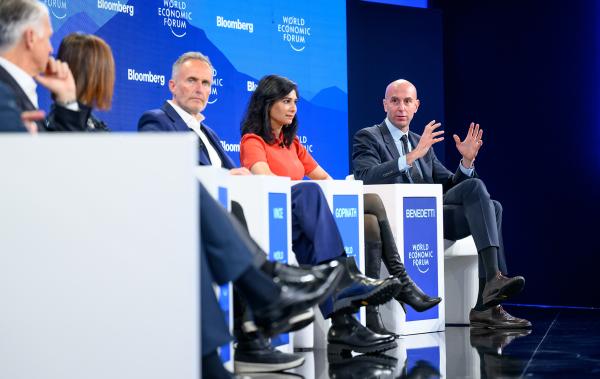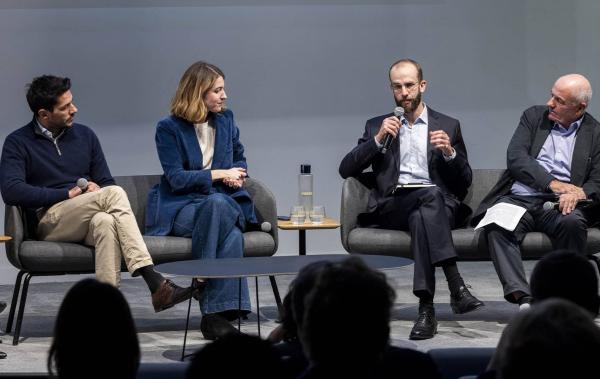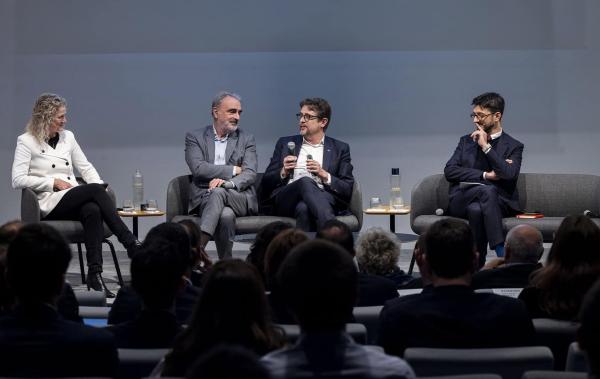Ardian’s Flightpath: Combining Growth and Sustainability in Airports
Market watch, Responsible finance
Ardian’s Flightpath: Combining Growth and Sustainability in Airports
-
20 March 2025
-
Infrastructure
Reading time: 7 minutes

Mathias Burghardt
Executive Vice-President, Vice-Chairman of the Executive Committee and CEO of Ardian France
Mathias Burghardt is Executive Vice-President and CEO of Ardian France, the Group's main regulated entity, which acts as an AIFM for direct investment funds.
He has led Ardian’s Technology and Innovation strategy since 2019, achieving major milestones such as creating proprietary digital platforms to generate value in portfolio companies and enhancing the efficiency of Ardian’s teams through data- and AI-driven solutions. Mathias also supervises Ardian's IT, brand and communications activities.
Mathias is the founder of Ardian's infrastructure team and has been leading the group's investment activities in this sector since 2005, making it a global leader in critical infrastructure. In addition to transformation and decarbonization strategy for portfolio companies, Mathias has led the launch of specialized funds focused on hydrogen (low-carbon) and nature-based solutions, aiming to accelerate the transition of industries, innovate in these areas, and prepare for the economy of tomorrow.
Today, he has developed extensive relationships with international industrials and financial sponsors, public authorities and regulators.
Mathias Burghardt joined Ardian in 2007. He started his career in 1989 with Crédit Lyonnais in Media Telecom before heading HSBC Advisory and Project Financing in France.
Chairman of Ardian Foundation, Mathias is also a member of the Board of Directors of the Alliance for Education - United Way, an organization with the mission is to promote equal opportunities and academic success for young people in priority education areas and rural zones.
Air travel is an essential element of our civilization, contributing to economic growth but also to the dissemination of ideas.
Our approach to investing in airports
Our approach to investing in airports
As one of the largest private investment firm in the world, Ardian has been a partner of airports for well over 10 years through our Infrastructure team. We see major airports as critical enablers of economic growth and large-scale employment – Heathrow, where we recently became the largest shareholder, is the UK’s number one port by value and the country’s biggest employment hub.
-
32.6%
stake acquired by Ardian in Heathrow in 2024/2025
Airports are therefore highly strategic assets that require a wide range of operational expertise. They also need shareholders with the financial strength to invest in new terminal construction, capacity upgrades, and better passenger services. Continuing growth in passenger numbers will create further large-scale opportunities for investment, economic development and job creation.
From the moment we invest we also commit to promoting sustainable development and the long-term decarbonization of airports and air travel.
Mathias Burghardt, Executive Vice-President, CEO of Ardian France and Head of Infrastructure, says that Ardian’s strategy for developing its airports is aligned with the UK government’s four tests for approving capacity increases at Heathrow. These relate to economic benefits, noise, pollution and climate targets.
Our airport management strategy has been based on close collaboration with governments, regulators and industrial partners to deliver capacity increases and improvements to the passenger experience.
“Along with our active management of these investments, this approach can achieve outstanding performance.” said Burghardt
London Luton Airport, a First Model for Growth
London Luton Airport, a First Model for Growth
Our first airport investment was in London Luton, a critical gateway and the UK’s fifth busiest air travel hub. In November 2013 we bought a 49% stake alongside Aena, the Spanish airport operator, and embarked on a major investment program.
We believed that Luton had huge growth potential thanks to rising demand for air travel and the need to provide additional capacity close to London. During our partnership from November 2013 to June 2018, we invested more than £160 million – modernizing and upgrading terminal facilities, adding new restaurants and shops, and expanding infrastructure with a multi-storey carpark.
Throughout our ownership, London Luton delivered a 50% increase in capacity and added dozens of new destinations. Passenger numbers increased from 9.7 million people in 2013 to 15.8 million in 2017, making London Luton one of the fastest growing airports in the UK and highlighting the business’s global growth potential.
Mathias Burghardt argues that expanding access to air travel brings social as well as financial gains. “Air travel is an essential element of our civilization, contributing to economic growth but also to the dissemination of ideas. We believe that modern, augmented airports can be essential hubs for multimodal transport, while remaining key players in local economic development.”
Throughout our ownership, we engaged with local communities to create a growth plan that would share the benefits of London Luton’s growth as widely as possible. Our period of ownership period saw the creation of around 3,000 direct and indirect jobs, demonstrating how airport investments can deliver large-scale community support and development.
-
£160million
invested in London Luton for expansion
-
50%
capacity increase and dozens of new destinations added at London Luton under Ardian’s ownership
Developing Expertise in Airport Infrastructure
Developing Expertise in Airport Infrastructure
Since 2013, when we invested in London Luton, we have intensified our focus on air travel, making further acquisitions and developing a technology-led approach to addressing the sector’s sustainability challenges. Our key international airport investment projects include:
• 2013: London Luton – the Infrastructure team at Ardian acquires 49% of London Luton Airport in partnership with the Spanish airport operator Aena.
• 2015: Milan Malpensa, Milan Linate, Naples, Turin – Investing alongside Crédit Agricole Assurances, Ardian Infrastructure acquires a 49% shareholding in 2i Aeroporti, which in turn owns 36% of SEA, becoming a key stakeholder of the Milan airports Linate and Malpensa, Naples, Torino and indirect stakes in Bergamo and Bologna airports. Later, the participation in Italian airports was extended to Salerno and Trieste as well.
• 2019: Ardian begins development of Ardian AirCarbon – a proprietary software platform that tracks scope 3 carbon emissions from airports in close to real-time. Ardian AirCarbon also allows airport operators to model the trajectory of future GHG emissions under different scenarios
• 2023: First third-party implementation of Ardian AirCarbon – Ardian partners with Keflavík Airport in Iceland to track scope 3 emissions using Ardian AirCarbon
• 2024/2025: Heathrow – Ardian acquires a 32.6% stake in Heathrow from Ferrovial, CDPQ and USS, making Ardian the airport’s largest shareholder.
Advancing Aviation Towards a Sustainable Future
Advancing Aviation Towards a Sustainable Future
Aviation brings economic and social benefits to millions but also creates major climate impacts. One of the key ways we are addressing these issues is to encourage greater adoption of sustainable aviation fuel (SAF). SAF will play a major role in achieving the decarbonization goals of all airports and we intend to turn Heathrow into Europe’s leading user of this fuel.
In January, Heathrow set the target of achieving 3% of SAF in the aviation fuel used at the airport during 2025, offering up to £86 million of support to encourage airlines to switch to it. Reaching that 3% SAF target would cut around 500,000 tonnes of carbon emissions from aircraft using Heathrow.
Efforts like this demonstrate our determination to address the sustainability issues arising from air travel head on. Another important initative is Ardian AirCarbon, our software platform for quantifying scope 3 carbon emissions from airports.
“We created Ardian AirCarbon to break down silos within the industry and enable effective collective action to reduce carbon emissions,” Pauline Thomson, Head of Data Science and Managing Director in the Infrastructure team.
As a long-term investor and shareholder in several airports, we believe it is our duty to support the transition to a more sustainable industry for future generations.
Our decision to build this tool was driven by the need to gain a detailed view of airport emissions from all sources, using near-real-time operational data to develop a workable decarbonization plan.
Today, Ardian AirCarbon is deployed at five European airports: Keflavík, Milan Malpensa, Milan Linate, Naples, and Turin, which collectively serve 59 million passengers a year. It allows these airports’ management teams to estimate the emissions of every aircraft using their airport from minute to minute.
But Ardian AirCarbon can also inform the planning process. It enables managers to model the effects on emissions from different operational decisions. This demonstrates how data analysis can help identify the most effective steps to sustainable decarbonization.
Ardian and the Future of Airports
Ardian and the Future of Airports
Over more than a decade of investment in airports, Ardian has developed deep expertise in managing these strategic and highly regulated national assets. Airports sit at the heart of the aviation sector and so can play a major role in delivering a more sustainable future for air travel. Our goal has always been to find growth strategies that maximize the benefits of air travel, while developing sector-leading expertise in addressing its decarbonization challenges.
We are excited to support Heathrow’s management team in achieving sustainable growth and advancing the transition to net zero.
This is the agenda we bring to our investment in Heathrow. This transaction marks a new stage in Ardian’s involvement in the aviation sector and represents a major platform for our vision of sustainable development in critical global industries.
The UK is a priority market for Ardian, and this transaction builds on our 17-year track record of successful infrastructure investments in the country.
“It is another example of how we are delivering Ardian’s strategy of investing in significant infrastructure in our core markets,” he adds.
For Ardian, this significant investment reflects our ambition and commitment to fostering a sustainable future for infrastructure.






